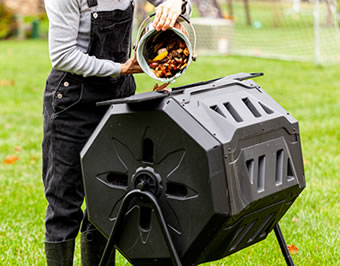Composting for
Canadians
Composting is one way we can all contribute to maintaining the health of our communities and the ecosystems we call home
What is Compost?
No matter where you call home, composting is
an essential tool in the organic farmer or
gardener’s toolkit. It can be made from organic
wastes like kitchen scraps, paper, and yard
clippings. Compost is an effective way to recycle
while creating a valuable byproduct that feeds
plants for healthy growth.
Compost Basics
Compost is prepared by managing the
decomposition of organic materials like yard
debris, grass, leaves, kitchen scraps, paper,
manures, straw, hay, wood chips and sawdust.
Compost is an interwoven structure of microorganisms that feed on these materials. The process breaks them down and releases valuable plant nutrients. As the microorganisms feed, the temperature of the pile will rise.
Temperatures can reach as high as 130°F during peak decomposition. As more material breaks down, the temperature of the compost pile will decrease to ambient air temperatures. At this point, the pile cures and is ready to be added to soil.
Building Blocks of Compost
There are 4 basic elements that are required for
composting:
- Water
- Oxygen
- Nitrogen
- Carbon
Water is necessary for sustaining the microbial life in the pile and oxygen maintains aerobic conditions.
Nitrogen-rich materials, commonly referred to as “greens,” are typically moist and contain a higher ratio of nitrogen to carbon. Greens are food waste, grass, coffee grounds, and others.
Carbon-rich materials, or “browns,” help balance the green materials and are typically dry, brittle materials like leaves, straw, newspaper, and wood chips.
“Greens”
- Most food waste
- Coffee grounds and filters
- Vegetables and fruits
- Egg shells
- Manures
- Grass
- Soiled napkins and paper plates
- Newspaper
- Leaves and straw
- Wood chips
- Yard debris
- Plastic
- Glass
- Metal
- Styrofoam
- Meat*
- Dairy*
- Oily products*
- Fatty products*
Choosing a Compost System
There is no one right system that is best for composting. The various bins and systems available have different costs and benefits, but all can be successful. The most important factors of consideration are where you live, and how (much) you garden.
One of the most common methods is the ‘open pile’ approach. It works if you have some land and

the proximity to neighbors is low. Open piles tend to be managed less, and pests and foul odors can occur.
You can build your own bin from welded wire, wood pallets, chicken wire, cinder blocks, drums and trash cans. Welded wire bins are the most cost effective. You can also purchase a pre-made bin at your local gardening store or online.
Elevate your bin on a wooden pallet or line the bottom with stalky material to increase airflow and drainage.
When choosing a bin, keep volume in mind. We recommend something 3x3x3 feet or larger. This will minimize the surface-to-volume ratio and improve heat retention during composting.
There are many great resources available to help you get started with composting. You can visit your local library, do a search on Google, but likely the most effective way is to start at your local garden centre and ask to speak to someone about composting systems.

